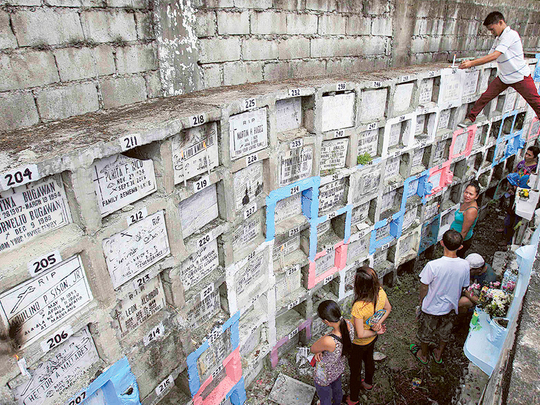
Manila: As Filipinos pay respects to their departed on All Saints Day and All Souls Day, a lawmaker lamented that the cost of dying in the Philippines is no different from keeping a person alive for most in the country.
Dying may be a way out of the hardships of living, but for the family left behind, it is the beginning of even more difficulties, Terry Ridon, representative of the Kabataan (Youth) partylist said.
A predominantly Christian country, it is common practice in the Philippines to hold at least three days wake for the departed as the family and friends mourn. But the high cost of holding the ritual had become prohibitive for most Filipinos.
“Most funeral and burial services in the country are beyond the means of many Filipinos,” Ridon, a lawyer, said as he has asked Congress to review existing rules and regulations governing the funeral industry.
Ridon filed a resolution calling on the House Committee on Health and Committee on Social Services to “review existing laws and regulations on funeral and burial services, towards providing the public with accessible and quality funeral and burial services, especially for the indigent section of the population.”
“Death has a significant place in the cultural fabric of our nation. However, perhaps due partly to the weak regulation of this industry, funeral and burial services have become generally unaffordable for most Filipinos. Worse, there are many reports of substandard services that rub salt into the wound,” Ridon explained.
Often, the family of the departed has to contend with the loss of their loved one as well as huge debts incurred for funeral services.
Ridon decried what he called “abusive practices” in the funeral industry where morticians practically hold the body hostage and demand ransom from the kin.
He said some funeral operators claim dead bodies from local hospitals and embalm them without consent from the families of the deceased. After doing this, they would compel the family of the deceased to pay a certain amount to “buy back” the bodies of their loved ones.
“In many cases, families are also forced to extend the wake of their loved ones for more than a week to buy time and get more ‘abuloy’ or “passing around the hat” or contributions from people who pay their respects to the deceased.
“The practice of holding illegal gambling activities during wakes has also become the norm to help the family pay for funeral and burial services,” Ridon said
Ridon blamed the cause of the bad practice to what he described as “weak regulation” of the funeral industry.
The more creative funeral service providers offer what others jokingly describe as “die now pay later” schemes wherein the family of the departed could avail funeral services and recompense for it in instalments. Another scheme provides for coffins that could be rented.
Ridon said the law set proper procedures for burial, in addition to laying down requirements for crematorial and funeral establishments.
There are also rulles for locational clearance of funeral establishments he said.
“However, the implementation of these regulations have not been reviewed in recent years, even as problems besieging the funeral and burial industry continue to abound,” Ridon explained.
The lawmaker called for legislation that will “protect the rights of the people to accessible and quality funeral and burial services for their families and loved ones.”
“This legislation should protect them from abusive profiteering tactics by private funeral contractors and must be enacted and enforced in the furtherance of existing rules and regulations governing funeral and burial services,” Ridon explained.
“Through enacting regulatory legislation on funeral and burial services, the people can be protected from excessive prices for services and unfair practices in the funeral industry,” Ridon concluded.
Millions of Filipinos remember their deceased loved ones on November 1, All Saint’s Day as well as Nov. 2, All Souls Day.












